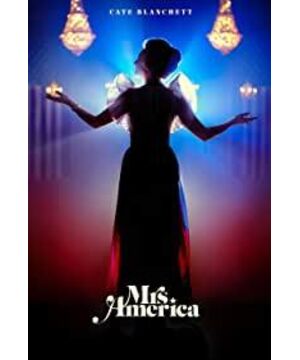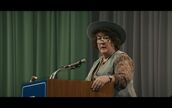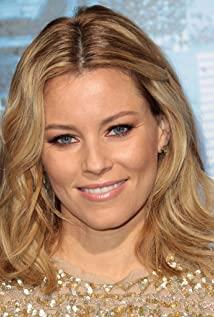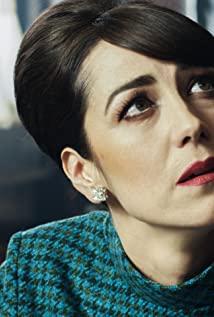The background of Mrs. America is in the early 1970s. At that time, almost ten years had passed since Martin Luther King Jr. said "I have a dream" in 1963. Women's rights, the anti-Vietnam War, the gay rights movement, and multiple waves came one after the other, rolling in each other.
In this noisy and chaotic era, the ambition of this drama is undoubtedly great. It wisely chose to start from flesh and blood characters, and each episode focused on one person, followed her footsteps, and gradually spread out the "second wave of feminist movement" behind her. When watching it, I strongly felt the existence of two forces, which interacted and canceled each other: one was personal choice, and the other was destiny under the great era.
After the "first wave of feminism" in the United States at the end of the 19th century, women already had literal, legal equality. Women can vote, pursue higher education, and secure jobs and health care. Standing before the feminists of the 1970s was a more invisible opponent.
Back then, America was experiencing a baby boom, the economy was booming, and people were craving stability and happiness. Under the dominance of traditional family ethics, women are the outsiders and men are at home, going to church on weekends, and children playing in the backyard. This is what happiness should be in the hearts of most Americans. This is what a woman should be like. Many women who have received higher education are still expected to return to their families after graduation, take charge of housekeeping, raise children, prepare dinner and wait for their husbands to come home.
At that time, the feminist activists were not facing a state machine that was flexing its teeth and claws to seize power, but a smiling invisible network with a protective attitude. Its fibers are drawn from all aspects of life and are woven into everyone's life at the same time. It's a story created by the collective subconscious that tells men and women what it means to be a woman - at home, in the kitchen, as a wife and mother.
From time to time in the play, on the background TV, commercials at that time will be broadcast. Many daytime advertisements are for homemakers. Drink ads will tell them how good it is to be low in calories, so your husband will notice your changes. Fitness advertisements tell housewives that being thin is the secret to keeping a marriage fresh.
This is the conundrum faced by feminists at the time (and now) - that enemy is everywhere, but at the same time seems commonplace.
The first episode of the show begins with a contradictory woman who is also the protagonist, Phyllis Schlafly (played by Cate Blanchett). She is a mother of 6 and a smart, fun, social, and attractive housewife. Her husband is a successful lawyer, and Phyllis is full of admiration and respect, and the two have a sweet and happy relationship. But on the other hand, her family is extremely unconventional, even advanced by today's standards.
Phyllis has political ambitions, ran for state legislature twice (lost twice), and although she doesn't have the same Harvard Law degree as her husband (she eventually went to law school at age 50), compared to her husband, She is more passionate about current affairs. At the beginning of the first episode, it was shown that she was on a TV show, talking to the male guest on the opposite side, and talking about national security issues. Feminist activist Bella Abzug commented at the time that Phyllis told other women to stay at home, but she was actually the most independent and free woman in America right now.
In the beginning, national security was her main research topic. In her eyes, feminists are just a bunch of jokes who don't love men and can't be housewives. Or a bunch of gay people. In short, she disdains the topic of women, and doesn't think they will become a climate.
However, her political career has suffered setbacks everywhere. When she heard about the ERA from Alice, she realized that this might be her chance to throw a punch.
Her friend Alice (one of the few fictional characters on the show, played by Cate's best friend Sarah Paulson) is a woman who has never dealt with a man other than her husband, children, father, and pastor in her life. She is Phyllis's friend on the show, and the one Phyllis wants to represent and mobilize: housewives attacked by feminists. But the difference between Phyllis and Alice is too obvious. Phyllis navigates with ease among politicians, lawyers, media practitioners (mostly men), but also experiences a lot of discrimination that seems bizarre to modern eyes - male politicians use her like a secretary, hook up at will, invite her to Swimsuit show - then those all seemed to float past her like feathers and couldn't hurt her.
As it turns out, the anti-ERA was a battle that belonged to Phyllis.
ERA (The Equal Rights Amendment) is the main line around which the play revolves. It was proposed in 1923 and was overwhelmingly passed by the US Congress in 1971. At its core is "guarantee equal legal rights for all American citizens regardless of sex". As a federal country, after this Amendment is passed by Congress, the next step needs to be implemented in each state. Only after 3/4 of the states, that is, 38 states, will it be written into the constitution.
The ERA was passed in Congress by someone at the "Avengers" level in the feminist world: Bella Abzug, the leader behind the movement, Shirley Chisholm, the first black woman to run for president (by Crazy in Orange Is The New Black). Eye, played by Emmy winner Uzo Aduba), Betty Friedan, who wrote The Feminine Mystique inspired a generation, and Gloria Steinem, perhaps best known as the movement's "spokesperson".
While the group of feminists was celebrating, the camera cut to Phyllis sending out his own newsletter, mobilizing everyone to call his state legislator and vote against the ERA. She saw the weakness of her opponents: they rejoiced and had let their guard down.
Under the waves, there are many housewives' indignation. They feel hurt by sharp feminism. They tried their best to maintain family order, but they were accused of being useless, stupid, and brainwashed. Some of them also questioned the value of their existence and imagined whether they had other possibilities outside the family. But at that time, the feminist movement, which refused to be moderate and could not help but talk about it, did not provide the answers they wanted. Phyllis seized on this point and, through his political genius, mobilized many housewives.
Ironically, the leaders of Phyllis's movement encouraging women to "stay at home and not guilty" are women who run away from home and realize their self-worth through political campaigns.
The historical facts have been settled, and the fact that the ERA did not pass in the end does not need to be spoiled. This show isn't about answering "why". Just by presenting the people inside, their choices, lead us step by step to the final result.
I was most impressed with the episode where Shirley ran for president. As the first black person to run for president, the first woman to run for president as a Democrat, she was less well known. There is a picture in it of her arguing with other feminists. In the general election, Shirley had a slim chance, with only 2% of the votes. He was persuaded by various parties to drop out of the election and return to the leadership of George McGovern, who had the best chance to defeat Nixon at the time. The ones who persuaded her to drop out of the election were the National Women's Political Caucus, a feminist organization she co-founded.
She questioned them, I am a woman, and the interests I represent are the same as yours. Why don't you fully support me, but try to tout the white man? Knowing that he won't and can't go all out to fight for what you want? Bella, who is the most realistic and least emotionally driven leader who only sees the "big picture" on the show, criticizes Shirley for being unrealistic. She said that the priority now is to choose an opponent who can defeat Nixon, so even if she is ideally perfect, it is impossible for feminist groups to abandon McGovern as an ally and support her.
Sandwiched between black and female identities, Shirley confronts Black Caucus, who also has concerns. Black Senator Ron Dellums asked her, are you representing black people or women?
Shirley said to him, can't you see I'm black?
What she faced seemed to be an unsolvable deadlock. She needs allies to give her a bigger platform and the political capital to defeat her opponents. But her seemingly natural allies will not give support casually unless she already has enough political capital. In the end, she gave up the campaign and said something that made me cry, "Why am I the only one who thinks a black woman being president is worth the run?"
Considering this ideal and reality, in the 2020 election year, history will repeat itself ridiculously.
Shirley laughs at the naivety of feminists. True equality, she said, cannot be obtained by demand. "You put on a real show but don't mistake for that real political power. You are betting for crumbs from the pie." You think you're fighting men face to face, but you're actually fighting within their boundaries That's it. In the end, even if the ERA passes, it may just be a symbolic success. It's the crumbs that men feed to feminists.
In the end, whether it was Shirley or the feminists who took the overall situation into consideration, they all failed to varying degrees. Who can say who is more right.
The show gives a feeling of powerlessness all the time - too much running around and telling the story, and it's ultimately useless. The rules were set early in another room, by a group of people who were out of their reach.
And the final picture of that episode was that all the presidential candidates appeared, and Shirley stood in the middle and waved to everyone among the white men. Whether it's a symbol or an actual progress, that's the scene that moved me the most in the whole play. I am moved because there is still hope.
View more about Mrs. America reviews











